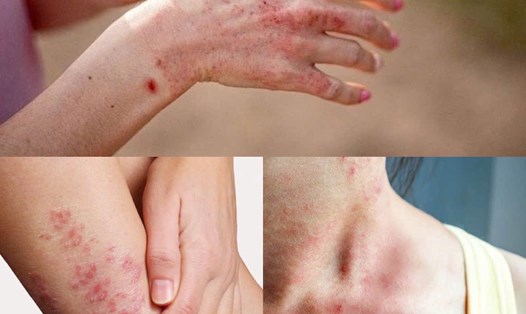According to Colonel, Dr. Vu Viet Sang - Deputy Director of the Institute of Clinical Infectious Diseases, Head of the Department of Respiratory Diseases, 108 Central Military Hospital, these are very favorable conditions for pathogenic microorganisms to develop and cause disease in humans.
Experience has shown that infectious diseases often follow floods.
Gastrointestinal diseases: Acute diarrhea, cholera, bacillary dysentery, amoebic dysentery, typhoid, E.coli infection, viral hepatitis A.
The cause is due to domestic water sources, drinking water sources, food and food being contaminated by pathogenic microorganisms (bacteria, viruses, fungi, protozoans).
Common skin diseases include: athlete's foot, hand, folliculitis, ringworm, pityriasis versicolor, scabies, boils. In addition, people in flooded areas can contract some dangerous infectious diseases transmitted through the skin and mucous membranes such as whitmore's disease, leptospira disease, vibrio vulnificus disease... The cause is dirty water, contaminated with microorganisms and fungi that cause disease; because people in flooded areas often have to soak their hands and feet in dirty water for a long time, due to humid living conditions.
Eye diseases such as pink eye, blepharitis, and lacrimal gland inflammation are also easily caused by polluted living environment and drinking water sources.
Respiratory diseases such as colds, flu, sore throat..., people are also susceptible to catching colds when having to soak in water for a long time, lacking clothes, blankets; houses are not properly covered to protect against wind, people even have to move to crowded places, not ensuring hygiene.
Common mosquito-borne diseases include dengue fever, because after floods, conditions are very favorable for disease-causing mosquitoes to breed and develop. Temporary living conditions are not guaranteed.
Measures to prevent epidemics during and after storms and floods include cleaning water tanks, wells, and water containers; filtering drinking water with clean sand or alum to settle, then disinfecting the water with Cloramin B according to the instructions of medical staff.
Choose clean food and prepare food safely and hygienically, eat cooked food and drink boiled water, do not eat old or spoiled food.
Wash your hands regularly with soap before and after preparing food, before eating and after using the toilet.
Practice personal hygiene daily, wash feet and dry between toes after contact with flood water or contaminated water, do not wear wet clothes.
Avoid swimming in dirty, stagnant water. If you must swim in dirty water, rinse immediately with clean water and dry thoroughly, especially between fingers and toes.
Clean up as water recedes, collect, treat and bury animal carcasses according to the instructions of medical staff.
Destroy larvae/wigglers, kill mosquitoes by covering tanks, water containers, putting fish in large water containers, removing waste such as bottles, jars, car tires... or natural water holes, to prevent mosquitoes from laying eggs.
Use mosquito nets when sleeping to avoid mosquito bites, even during the day. Always keep your body warm, especially the elderly and children; eat nutritious food, supplement vitamins, minerals... When there are signs of suspected infection, you need to go to the nearest medical facility for examination and treatment.
According to Colonel Vu Viet Sang, patients should not be subjective, but should go to medical facilities for examination when there are unusual signs of health.
Furthermore, poor control of underlying diseases and existing chronic diseases due to difficult traffic conditions during the rainy and stormy season and the inability of patients to visit medical facilities for regular check-ups is also the reason why medical examination and treatment do not bring about the desired results.









